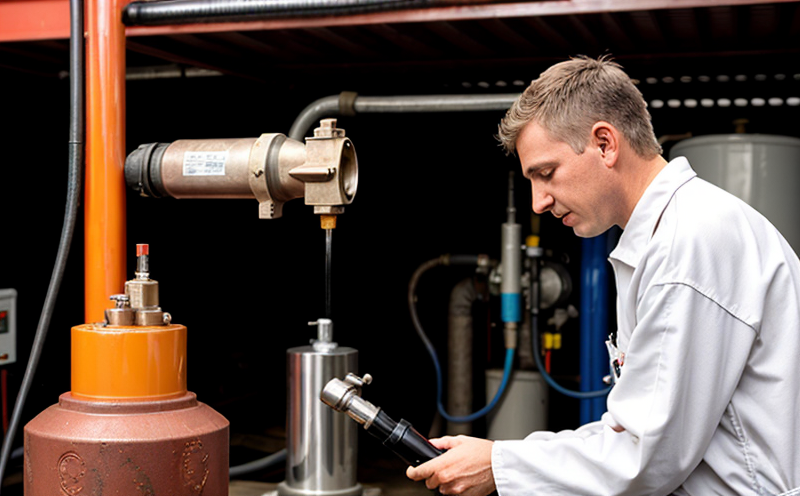ASTM D473 Sediment and Particulate Matter Testing
The ASTM D473 standard is a crucial method used in the aerospace and aviation sectors to ensure fuel quality, particularly focusing on sediment and particulate matter content. This test evaluates the cleanliness of jet fuels by measuring the amount of solid particles that can settle out over time. The presence of these contaminants directly impacts engine performance and longevity, thereby influencing aircraft safety and operational reliability.
The ASTM D473 procedure involves several critical steps to ensure accurate results. Initially, a sample is taken from the fuel tank or supply line. This sample must be representative of the entire batch of fuel under test. It's crucial that the sampling process adheres strictly to industry best practices to avoid contamination or alteration of the specimen.
The sampled fuel undergoes a series of steps including filtration and drying, followed by centrifugation at specific temperature conditions. The sediment formed during this process is then carefully measured using standardized methods. This measurement provides insight into the amount of particulate matter present in the fuel, which can be indicative of the overall quality and potential risks associated with its use.
The test results are typically reported as weight per volume or mass concentration. These values help in identifying whether the fuel meets the required specifications set by international standards such as ASTM D473 itself, ICAO (International Civil Aviation Organization), and other relevant aviation regulations. Compliance with these standards ensures that aircraft engines operate efficiently without facing issues related to abrasive wear or blockage due to particulate matter.
Understanding the importance of this test extends beyond mere compliance; it also plays a vital role in maintaining high standards within the aerospace industry. By adhering strictly to ASTM D473 guidelines, laboratories can provide reliable and accurate results that contribute significantly towards enhancing aircraft safety and reducing maintenance costs associated with fuel-related problems.
Real-world applications of ASTM D473 sediment testing are numerous. For instance, airlines conducting routine inspections or pre-flight checks often rely on these tests to ensure they have clean fuel before loading into their planes. Similarly, manufacturers might use this test during the production process to monitor quality control measures and identify any potential issues early on in the supply chain.
In summary, ASTM D473 sediment testing is an essential tool for maintaining optimal fuel quality in the aerospace sector. Its role in ensuring clean fuel contributes significantly towards enhancing aircraft safety and operational efficiency. By understanding its significance and implementing it correctly through rigorous sample preparation and precise measurements, stakeholders can effectively address concerns related to particulate matter content.
Why It Matters
The importance of ASTM D473 sediment and particulate matter testing cannot be overstated. In the context of aerospace & aviation, fuel quality is paramount for several reasons:
- Safety: Contaminants in fuels can lead to engine malfunctions or failures during critical operations like takeoffs and landings.
- Performance: Clean fuel ensures better engine performance, extending the lifespan of aircraft components.
- Cost Efficiency: Reduced maintenance costs due to minimized wear and tear on engines and related systems.
- Environmental Impact: Cleaner burning fuels contribute positively towards reducing emissions, aligning with global environmental goals.
These factors underscore the necessity of adhering strictly to ASTM D473 standards when performing sediment and particulate matter tests. Compliance not only ensures that fuel meets regulatory requirements but also supports sustainable practices within the industry.
Eurolab Advantages
At Eurolab, we pride ourselves on offering comprehensive services tailored specifically to meet the stringent demands of the aerospace and aviation sectors. Our expertise in ASTM D473 sediment and particulate matter testing sets us apart from other laboratories:
- Accurate Results: Using state-of-the-art equipment and adhering meticulously to ASTM D473 procedures, Eurolab ensures precise measurements of sediment and particulate matter.
- Comprehensive Reporting: Our reports provide detailed insights into the test results, including visual representations such as photographs of settled particles. This transparency allows our clients to make informed decisions regarding fuel quality.
- Rapid Turnaround Times: Eurolab understands the urgency associated with fuel testing in aviation and strives to deliver timely reports without compromising on accuracy.
- Compliance Assurance: By staying abreast of all relevant international standards, including ASTM D473, ICAO regulations, and more, Eurolab guarantees that our tests are fully compliant with industry requirements.
We also offer additional services such as fuel analysis and lubricant testing which complement our core offerings in sediment and particulate matter testing. These comprehensive services position Eurolab as a trusted partner for all your aerospace & aviation testing needs.
International Acceptance and Recognition
The ASTM D473 standard enjoys widespread acceptance across the globe, especially within the aerospace and aviation industries. Its recognition is attributed to its robust methodology and consistent results which are widely accepted by regulatory bodies worldwide:
- ICAO (International Civil Aviation Organization): The ICAO incorporates ASTM D473 into its recommendations for fuel quality, emphasizing the importance of sediment and particulate matter testing in ensuring safe air travel.
- FAA (Federal Aviation Administration): The FAA uses ASTM D473 as part of their certification processes for aircraft fuels, further reinforcing its significance within the aviation industry.
- EASA (European Union Aviation Safety Agency): Similarly, EASA references ASTM D473 in its guidelines to ensure that all member states adhere to strict fuel quality standards.
- Other Regulatory Bodies: Many other national and regional regulatory bodies across Europe, Asia, North America, and beyond also recognize the validity of ASTM D473 results.
This international acceptance underscores the importance of adhering to ASTM D473 standards not just in terms of meeting local regulations but also for ensuring consistent quality that can be trusted globally. At Eurolab, we ensure that all our tests are conducted according to these internationally recognized standards, providing you with results that hold credibility worldwide.





